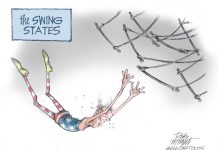Indiana has a real voting problem, but that’s not the problem that the state’s Republican supermajority lawmakers are interested in addressing.
As The Republic’s Andy East reported a few days back, lawmakers who control the Indiana General Assembly want to make it harder for people to vote absentee by mail. As East reported, House Bill 1334 would require voters who request a paper application for an absentee-by-mail ballot to provide the last four digits of the Social Security number, or their 10-digit driver’s license number, state ID number or voter ID number. Alternatively, applicants could instead submit a photocopy of any ID that meets state voter ID requirements.
Rep. Ryan Lauer, R-Columbus, voted for the bill as it passed the House, and Sen. Greg Walker, R-Columbus, voted for it as it advanced in the Senate.
The trouble is, this bill could actually deprive registered voters of their right to vote. As Julia Vaughn of Common Cause noted in a column on this page Wednesday, the state didn’t begin using Social Security numbers until the early 2000s. So a voter who has lived at the same address for the past 20 years would instead have a randomly assigned voter ID number. If they provided the last four of their Social instead, that might produce a mismatch that gets an application rejected.
This bill is an unneeded recipe for confusion for county election officials who already police for voting fraud, which, it’s worth mentioning, is virtually nonexistent. Furthermore, there are citizens in this state — particularly elderly people and those of limited means who are more likely to vote absentee by mail — who lack a government-issued ID card. Should that circumstance negate their right to vote?
Good-government groups oppose this bill for many good reasons, but let’s call this bill what it is. It’s a byproduct of election denialism by former President Donald Trump and his most ardent supporters who embraced his lies that the 2020 election had been stolen from him and that voter fraud was rampant.
As we mentioned at the outset, Indiana does indeed have a voting problem, but it is not election fraud. The problem is, too few people vote. It’s a well-chronicled problem with well-documented solutions. For whatever reasons, though, our Indiana lawmakers are not advancing bills that would encourage voting and make it easier.
Indiana consistently ranks among the bottom 10 states in the nation in voter turnout. In the 2020 general election, turnout in Indiana was 60.6%, far behind the national average of 66.8%. Hoosiers’ voting rate in that election was 46th out of the 50 states.
The most recent Indiana University Indiana Civic Health Index found that states that consistently were in the top 10 for voter turnout do a few things Indiana doesn’t. They have automatic voter registration, same-day voter registration, unrestricted absentee voting, longer polling hours on Election Day, and some permit unrestricted mail-in voting.
Those states have greater voter turnout because their lawmakers chose to make voting easier, not harder.
We could do that in Indiana, but our leaders do not appear interested in addressing the chronic problem of our state’s anemic voter turnout.




